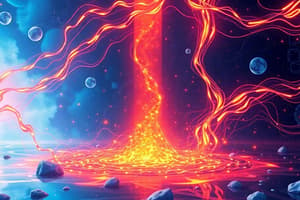Podcast
Questions and Answers
The unit of ______ heat capacity is J kg-1.
The unit of ______ heat capacity is J kg-1.
specific latent
The increase in length, area or volume taking place when an object is heated up is known as ______ expansion.
The increase in length, area or volume taking place when an object is heated up is known as ______ expansion.
thermal
The ______ of heat from a point at a higher temperature to a point at a lower temperature is known as heat transfer.
The ______ of heat from a point at a higher temperature to a point at a lower temperature is known as heat transfer.
flow
The three methods of ______ transfer are conduction, convection and radiation.
The three methods of ______ transfer are conduction, convection and radiation.
The amount of heat required to increase the temperature of a unit mass of the object by one temperature unit is known as ______ heat capacity.
The amount of heat required to increase the temperature of a unit mass of the object by one temperature unit is known as ______ heat capacity.
The heat required to convert a unit mass of a solid at its melting point into a liquid at the same temperature is known as ______ latent heat capacity of fusion.
The heat required to convert a unit mass of a solid at its melting point into a liquid at the same temperature is known as ______ latent heat capacity of fusion.
[Blank] is the forward flow of heat through any material by heating up of the constituent particles one by one in succession.
[Blank] is the forward flow of heat through any material by heating up of the constituent particles one by one in succession.
The heat required to convert a unit mass of a liquid at its boiling point into a vapor at the same temperature is known as ______ latent heat capacity of vaporization.
The heat required to convert a unit mass of a liquid at its boiling point into a vapor at the same temperature is known as ______ latent heat capacity of vaporization.
The quantity of heat Q is equal to ______ x θ.
The quantity of heat Q is equal to ______ x θ.
The heat capacity C is equal to ______ x c.
The heat capacity C is equal to ______ x c.
Flashcards
Specific Heat Capacity
Specific Heat Capacity
The amount of heat required to raise the temperature of 1 kg of a substance by 1 degree Celsius.
Conduction
Conduction
The transfer of heat through a material by the direct contact of its particles.
Thermal Expansion
Thermal Expansion
The increase in length, area, or volume of an object caused by heating.
Specific Latent Heat of Fusion
Specific Latent Heat of Fusion
Signup and view all the flashcards
Specific Latent Heat of Vaporization
Specific Latent Heat of Vaporization
Signup and view all the flashcards
Heat Transfer
Heat Transfer
Signup and view all the flashcards
Methods of Heat Transfer
Methods of Heat Transfer
Signup and view all the flashcards
Heat Capacity
Heat Capacity
Signup and view all the flashcards
Heat Energy Equation
Heat Energy Equation
Signup and view all the flashcards
Heat Capacity Formula
Heat Capacity Formula
Signup and view all the flashcards
Study Notes
Latent Heat
- The amount of heat required to change the state of a unit mass of a solid substance at its melting point into a liquid state is known as the specific latent heat of fusion of the substance.
- The specific latent heat of fusion of ice is 3.36 × 10^5 J/kg.
- The amount of heat required to change the state of a unit mass of a liquid at its boiling point into a gas state is known as the specific latent heat of vaporization of the substance.
- The specific latent heat of vaporization of water is 2.26 × 10^6 J/kg.
Evaporation and Vaporization
- The conversion of a liquid into a gaseous state is called vaporization.
- Vaporization can occur through boiling or evaporation.
- Boiling occurs at the boiling point of a liquid when further heat is supplied.
- Evaporation occurs below the boiling point of a liquid.
- Evaporation takes place only at the surface of a liquid exposed to air.
Heat Capacity and Specific Heat Capacity
- Heat capacity (C) of an object is the amount of heat required to increase its temperature by one temperature unit.
- Units of heat capacity are J K^-1 or J °C^-1.
- Specific heat capacity (c) of an object is the amount of heat required to increase the temperature of a unit mass of the object by one temperature unit.
- Units for measuring specific heat capacity are J kg^-1 K^-1 or J kg^-1 °C^-1.
Latent Heat and Thermal Expansion
- Latent heat is the amount of heat absorbed or released in a change of state of a substance without changing its temperature.
- The increase in length, area, or volume of an object when heated is known as thermal expansion.
Heat Transfer
- Heat transfer is the flow of heat from a point at a higher temperature to a point at a lower temperature.
- The three methods of heat transfer are conduction, convection, and radiation.
- Conduction is the forward flow of heat through any material by heating up of the constituent particles one by one in succession.
Studying That Suits You
Use AI to generate personalized quizzes and flashcards to suit your learning preferences.




